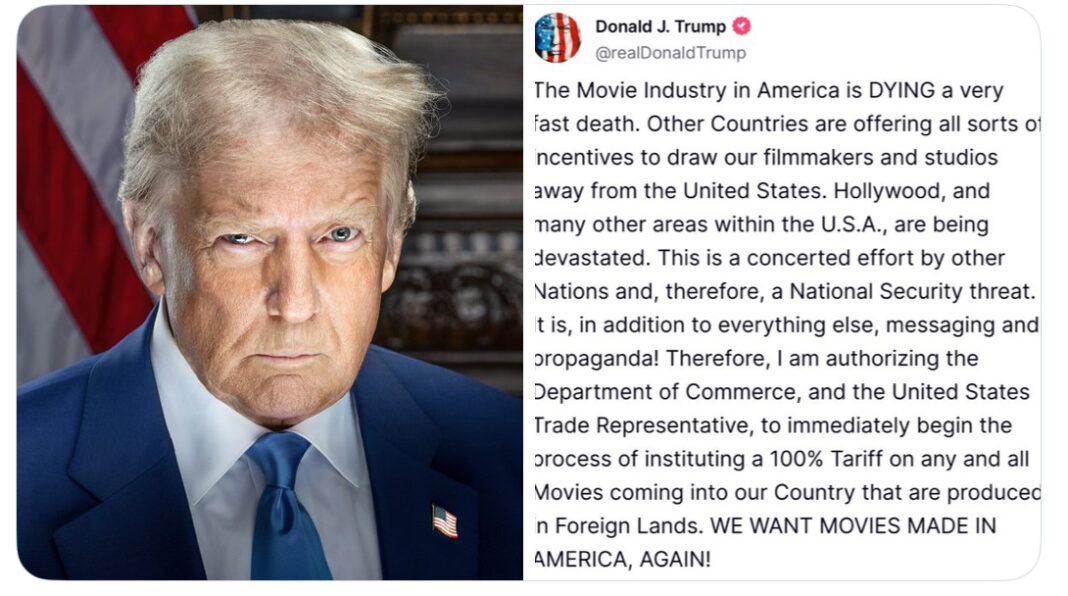Washington, D.C. – President Donald Trump announced Sunday evening that he has directed the Department of Commerce and the United States Trade Representative (USTR) to begin implementing a 100% tariff on all foreign-produced movies imported into the United States. The move, framed as an effort to revitalize the struggling domestic film industry, has sparked immediate debate over trade policy and cultural impact.
In a post on his official Truth Social account, Trump accused foreign governments of using subsidies to attract American film productions overseas, undermining Hollywood and the broader U.S. entertainment economy. He further described the import of foreign films as part of a larger messaging and propaganda strategy, warning that it represents a “National Security threat.”
“Hollywood, and many other areas within the U.S.A., are being devastated,” Trump wrote. “Therefore, I am authorizing the Department of Commerce, and the United States Trade Representative, to immediately begin the process of instituting a 100% Tariff on any and all Movies coming into our Country that are produced in Foreign Lands. WE WANT MOVIES MADE IN AMERICA, AGAIN!”
However, as of Monday morning, no formal executive order or policy memorandum has been published by the White House, and neither the Commerce Department nor the USTR has issued an official statement regarding the implementation timeline or enforcement mechanisms.
Trade Policy Implications
Trade policy experts have raised concerns about the legality and broader repercussions of such a tariff. The World Trade Organization (WTO)—of which the United States is a member—prohibits discriminatory tariffs on imported goods, including media products, except under narrow exceptions related to national security or anti-dumping measures.
The WTO’s Most-Favored-Nation Rule requires member nations to treat all trading partners equally, preventing arbitrary tariffs targeted at specific countries or industries. National Treatment Rules prohibit discrimination against foreign products once they enter the domestic market.
More information: World Trade Organization – WTO.org
Additionally, the U.S. is bound by several bilateral trade agreements, such as the United States-Mexico-Canada Agreement (USMCA) and the U.S.-Korea Free Trade Agreement (KORUS), both of which limit arbitrary tariffs on cultural imports. Violating these agreements could lead to trade disputes, retaliatory measures, or WTO arbitration.
Industry Reaction
The entertainment industry has reacted with mixed responses. While some independent American filmmakers welcome protectionist measures aimed at boosting domestic film production, critics warn that restrictions on international content could lead to cultural isolationism, international backlash, and increased costs for consumers.
One streaming platform executive, speaking anonymously, expressed concern about the potential impact on global content licensing and distribution, saying: “This would disrupt our entire content pipeline and raise serious questions about creative freedom and international cooperation.”
Additionally, China has recently reduced its import of Hollywood films, favoring domestic productions and tightened censorship policies. Some analysts believe this development may have influenced Trump’s decision, as the U.S. movie industry has faced declining revenue from one of its largest overseas markets.
Next Steps
It remains unclear whether Trump’s directive will face legal challenges or require congressional approval for implementation. Historically, tariffs under Trump’s administration have relied on Section 232 (national security concerns) or Section 301 (unfair trade practices) authorities—both of which have faced litigation in U.S. and international courts.
As the administration moves forward, further clarification on enforcement mechanisms, potential exemptions, and industry impact is expected in the coming days.
For updates, visit: https://gnbnow.com
A global media for the latest news, entertainment, music fashion, and more.














